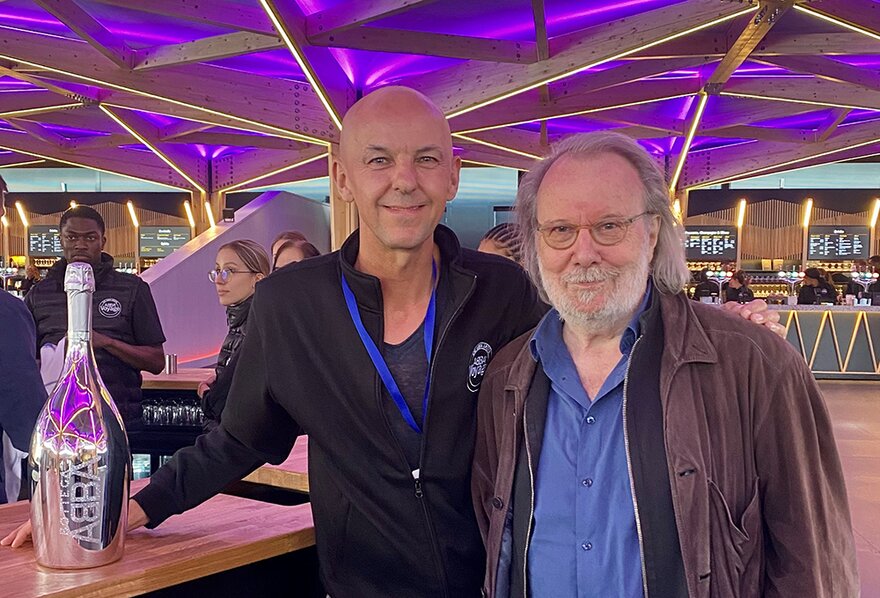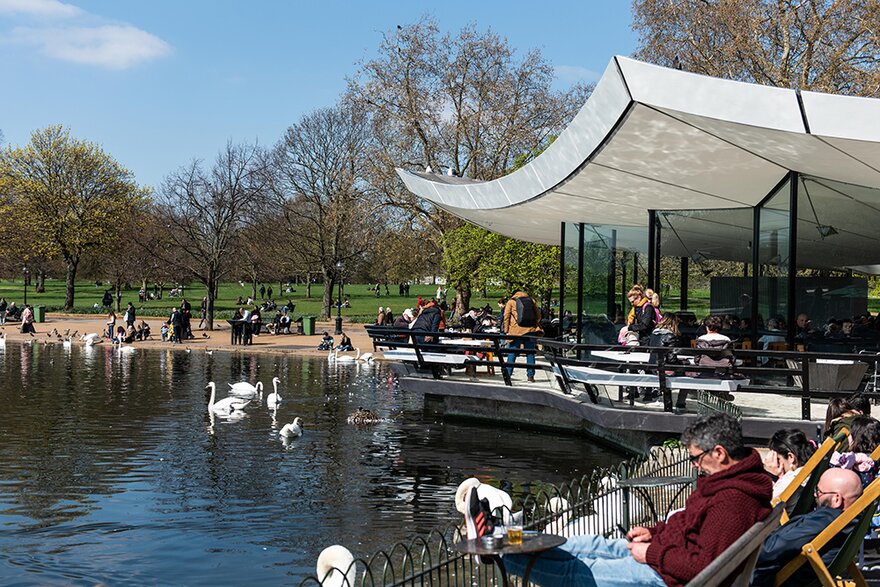The founder of Benugo has found success through tenders for his high-street café chain at everywhere from the V&A to the Abba concert. He speaks about making the shift and the company's exciting contracts
Foodservice caterer Benugo was initially known for its high-street coffee shops but has since moved into catering for spaces such as museums. How did this shift occur?
So much of Benugo's success has come about through chance and being at the right place at the right time. When Hugo [Warner] and I set up Benugo, it was going to be a chain of cafés. We never thought about whether we could be successful in museums – we didn't even know that opportunity existed. Because people liked what we were doing on the high street, we were asked to tender for places like the V&A, which was the first museum we moved into back in 2004. We were young and enthusiastic and were up against some old dinosaurs. We did such a good job with the V&A that we were asked to tender for other venues.
So does that mean Benugo's future is off the high street?
I'm avoiding the high street for the moment when it comes to new business, which is quite sad in a way because that's where we started. Business on the high street is very tough. On Mondays and Fridays, we're doing about a quarter of what we used to do. Tuesdays, Wednesdays and Thursdays are nowhere close to where they were in 2019. We've closed some of our high-street stores because we just can't make them work. However, I never say never, but rather, let's see what happens.
What has been your most exciting contract win over the years?
They're all so different, so I couldn't say one was better than another. But I love art, so somewhere like the V&A is fascinating to me. We are very privileged to see things that most people don't see; the inner workings of these museums and other spaces that you wouldn't typically have access to. For example, in Westminster Abbey, where we run a restaurant and café, I've seen parts of it that very few people get to see, with the Dean of Westminster. I've been in his private apartment, which has a door opening out into the Abbey itself, and you can feel the place breathing in front of you. I've been to places like the dungeons of Edinburgh Castle, where no one else has been.
Talking of exciting wins… how did your contract at the Abba Voyage arena come about?
The management team behind Abba Voyage wanted to find an operator to run the arena for them. They were very specific about who they wanted – while you didn't necessarily have to be an Abba fan, you had to have the principles, which is, absolutely everything is about detail, everything is about a level of excellence, from the welcome you get to the bars and the show itself, which is remarkable. And it was all built from nothing. It is one of the things I'm most proud of, because I think they gave us a brief and we answered it. As is usual with these things, there was a lot of competition to do it.
How has it been running that venue since you launched a year ago?
It's been such a monumental success. I mean, we've been incredibly successful with it but the show itself has been just phenomenal. Working with the Abba Voyage team has been an absolute privilege – they're a fantastic group of people. We answered the brief and we're selling what we think Abba fans want to eat in the lounge and in the bars and cafés. We're proud to be a part of that experience.
How many times have you seen the show?
I've been so many times. I honestly think I've seen the show all the way through about 10 times and obviously I go to the arena a lot, so I see bits of the show each time I'm there. It's always quite interesting to see the crowd, because from one day to another they can be really different.
Is that venue different from anything Benugo was doing before?
We also run the English National Opera at the London Coliseum and the Benugo bar and kitchen at BFI Riverfront, so we're quite familiar with running restaurants and bars at event spaces. However, the difference between the English National Opera and Abba is that Abba is the same show every single day. It's also a very, very different crowd.
This summer you're celebrating 25 years of Benugo – what are you most proud of achieving since launching the business?
That Benugo is the only food business to operate in all three of the South Kensington museums: the Natural History Museum, the V&A and the Science Museum. No one else has ever done that. We've also never lost a contract; we've always had our contracts renewed every time we've had to tender for them, which is really an endorsement of the job. I'm proud that some 60% or 70% of all our managers started as team members. I'm also proud that we've remained true to our core values, which is delivering simple, great food.
What are the major changes that have occurred in the world of foodservice over that period?
People are more health-conscious now than 25 years ago, so our percentage of salads versus sandwiches have altered significantly. Nowadays people are much more demanding about what they're eating and what's in it. There are so many more legal requirements than there were 25 years ago: we now must have allergens on our products, we have to have calorie counts and full ingredient disclosure on our products, which is difficult, time-consuming and costly. Today the standard of every operator is better, because if it's not better, you're not going to survive. It's a competitive market.
How are you feeling about the next 25 years?
Sometimes I find it difficult to predict the next week, let alone the next year or five years. But I'm optimistic because I think we're a flexible business that will adapt with the times and the demands of people. Technology is going to be a big thing: we've already got fantastic technology across Benugo outlets, from ordering on your phone to the new kiosk ordering, which we've introduced into the Science Museum. I've never had an ambition to take the world over. My ambition is to see people happy because of the food we serve.
How did the partnership with ClimatePartner come about?
We use a sustainable company to roast our coffee beans. Coffee, by nature, is very carbon-dependent, from the picking of the beans to the roasting and the grinding. ClimatePartner has been incredibly helpful in allowing us to calculate the end-to-end carbon cost of individual drinks across our coffee range. We have also chosen to offset all the carbon emissions associated with our coffee menu into projects that support local communities in coffee-growing areas, making our coffee carbon-neutral.
What else is Benugo doing to be environmentally friendly?
Late last year Benugo rolled out science-based carbon labelling for cakes and chilled food in its cafés and restaurants, in a pilot in partnership with the Natural History Museum. There are plans this year to roll this out for café and restaurant menus, too. The labels highlight scoring levels of their carbon impact from A-E, with the aim of nudging customers towards sustainable choices.
How has trading been recently?
Covid was a complete and utter disaster for our industry. Benugo suffered, like all our colleagues and competitors, in every single way. In my eyes, there's also Brexit, which has affected the rate by which companies like mine have been able to accelerate back up to where they were in 2019. The good news is that businesses have come back very strongly. This year, month-on-month, we're seeing 2019 numbers or more in most of our operations, with the exception being the high street, which is really, really tough.
Which areas of the business have come back the strongest after the pandemic?
Railway or transport hubs are doing fantastically. We have Benugos in Waterloo and St Pancras stations, and places like that will continue to do very well for us, because there are so many tourists. Our spaces in museums are doing very well, I think because people have more leisure time, and public spaces are also doing well, such as Hyde Park and St James's Park, so that area has really bounced back too.
What are the biggest challenges the business is facing right now?
For us, the main challenges are around staffing and product availability. Brexit was slightly shrouded in Covid, so we didn't initially understand the full catastrophe of it. And as far as I'm concerned, it's a catastrophe. A number of our suppliers who used to buy fantastic produce from Europe have just about given up trying to supply the UK because there is now so much red tape. Many of our amazing European staff that we had in 2019 went home during Covid, and of course they wouldn't have been allowed to come back again so we have a massive staff shortage. We are employing some fantastic British staff, but many of them are younger and they require a lot more training than our European colleagues did. They also want to be much more flexible in their working times and they tend to be a little bit more transient.
Your first job in hospitality saw you working for Raymond Blanc in his bakery Maison Blanc. How did that experience shape what you wanted to do within the industry?
I always loved cooking, even as a child, and I wanted to do something with food as a career. I wrote to Raymond when I was 16 and luckily, he accepted me as an apprentice in his bakery. Never underestimate how tough this industry is, particularly when you're on the floor or you're working the night shift in a bakery when you're 16 or 17 years old, and all your mates are out having fun. That experience taught me that it was a tough industry, but it's fun, you meet fantastic people and it's very creative. I loved learning how to make bread and pâtisserie. Creating taste explosions in people's mouths is such a fantastic thing, as is having the ability to make someone's day better by giving them something that they enjoy.
And finally if you could request one thing from the prime minister, what would it be?
Scrub Brexit.
Continue reading
You need to be a premium member to view this. Subscribe from just 99p per week.
Already subscribed? Log In






